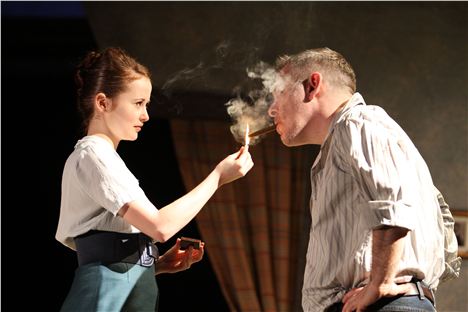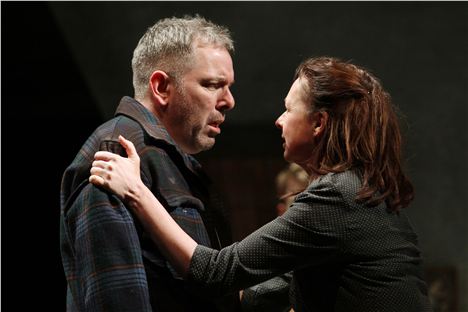ARTHUR MILLER'S text is about an ordinary working-class docker's family of New York’s Lower East Side. They call them longshoremen over there but wharfside stevedores all the same. Same hooks, same comradeship, same hard graft. What starts out as yet another day soon turns into a tragedy of epic proportions.
Within that fiercely independent émigré community, codes of honour and male pride were of prime importance amidst the poverty and overcrowded brownstone tenements. To lose respect amongst your work mates was tantamount to social emasculation.
In Miller's mind, it was worthy of a tale worth telling. He set to work himself, going undercover, to discover widespread corruption, gangster-ridden unions and occasional unsolved disappearances. This gave him first-hand material to weave a gripping narrative spiced with deceit, jealousy, betrayal and guilt.
 Shannon Tarbet As Catherine, Lloyd Hutchinson As Eddie In A View From The Bridge. Pix Stephen Vaughan
Shannon Tarbet As Catherine, Lloyd Hutchinson As Eddie In A View From The Bridge. Pix Stephen Vaughan
This production of A View From The Bridge gives ample scope for newcomer Associate Director Charlotte Gwinner to get to grips with the gritty realism of Miller’s polemic storyline. Her introduction to the Liverpool Playhouse follows winning the prestigious Quercus award. Given the recent re-opening of the brand-new and long-anticipated Everyman, it must have felt like a baptism of fire.
All this mirroring Miller’s own predicament in the midst of McCarthyism and the “naming of names” whilst getting more intimately involved with Hollywood’s screen goddess, Marilyn Monroe.
The unfolding tale relates to a threesome family… Eddie Carbone [Lloyd Hutchinson], his wife Beatrice [Julia Ford] and niece Catherine [Shannon Tarbet]. Their daily grind is interrupted by a request to put up to two illegal Italian immigrants as lodgers. Their arrival coincides with Catherine’s desire to get on in life in a new job. This soon becomes less important when she’s smitten by one of the arrivals, Rodolpho [Andy Apollo].
Whilst Eddie comes across a brash and uncompromising, Beatrice is hard-headed and Catherine is saccharine-sweet. Her blossoming relationship with Rodolpho is plausible but lacks vital onstage chemistry. Dialogue exchanges in the microcosm of the family kitchen were both sharp and concise. New Yorkers don’t hold things back and, in this case, they come loaded with acerbic asides.
Eddie’s life descends initially into concern, then fear and eventual loathing of the newcomers. He seeks the advice of a family lawyer Alfieri [Bruce Alexander] for guidance but is told nothing can be done since no law has been broken – well, apart from their immigration status. Alfieri’s role, also, includes that of occasional narrator which later transforms into an unwilling listener to Eddie’s woes.
 As the play unfolded, Eddie’s transformation from jealous father-figure to potentially licentious love-rival turns into a personal warpath for revenge and retribution. Beatrice’s role as peacemaker gets more difficult as blame gets blown around like confetti…her recurring retort of “not being able to understand” Eddie’s logic or that his conflicting demands for Catherine’s future is underscored by his apparent lack of libido. Sympathy isn’t her strongest point.
As the play unfolded, Eddie’s transformation from jealous father-figure to potentially licentious love-rival turns into a personal warpath for revenge and retribution. Beatrice’s role as peacemaker gets more difficult as blame gets blown around like confetti…her recurring retort of “not being able to understand” Eddie’s logic or that his conflicting demands for Catherine’s future is underscored by his apparent lack of libido. Sympathy isn’t her strongest point.
Overall, this production resonates with a variety of local themes and issues – waterfront politics, a casual labour market, challenges to customary roles, fear of “the other” through illegal immigration to name a few. Miller’s subtext for the play is classic Greek tragedy but achieved through New York’s uncompromising drawl which, to the credit of the ensemble, came across as quite convincing.
It’s not an uplifting story by any means. There is no effort to justify Eddie’s tortuous breakdown or instil any sense of personal salvation. It’s often pitiless and cruel based on codes of conduct unrecognisable to anyone living outside its mean streets. So it was that the American dream became the waking nightmare from which Eddie had been left well behind and felt so excluded. His ultimate demise at the very hands of those he’d tried to help is pure irony…tinged with cold heartlessness and betrayal.
Finally, mention must, also, go to the stage design team led by Paul O’Mahony who created a splendid minimalist set compromising a kitchen and a set of stairs on a raised platform. This helped to focus attention on the central action itself.
7/10












